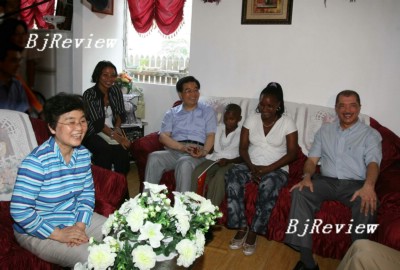
Chinese President Hu Jintao's recent eight-nation tour of Africa further cemented ties between the two sides with the signing of 50 cooperation agreements, most of which are measures to implement the results of the China-Africa Summit held in Beijing last November.
In Monrovia, the capital of Liberia, Hu attended the inauguration of the first China-assisted malaria prevention and treatment center in Africa on February 1.
In Lusaka, Zambia's capital, on February 4, Hu and Zambian President Levy Mwanawasa unveiled the Zambia-China Economic and Trade Cooperation Zone, the first that China has planned to build and participate in on the continent. By 2010, when the area is established, it is expected to become a zone for industry, trade and social services and attract more than 60 foreign enterprises, with an investment of $800 million and providing 6,000 jobs.
On February 9, in Maputo, the capital of Mozambique, the Chinese president inaugurated an agricultural technology demonstration center, one of 10 such centers that China has pledged to set up in the next three years in Africa, aimed at providing technological aid for African countries to improve their agricultural output.
On February 10, Hu visited the construction site of low-cost housing built with preferential loans from China in Victoria, capital of the Seychelles.
These are among over 800 projects in which China is involved in Africa.
Besides the above four countries, President Hu also visited Cameroon, Sudan, Namibia and South Africa on his tour from January 30 to February 10.
During the visit, Hu announced a series of concrete plans or measures, including the following: China will reduce or exempt the debts of African countries; expand the categories of African products that can be exported to China with zero tariff; build schools and professional training centers; set up agricultural demonstration centers and build stadiums or gyms in Africa, thereby demonstrating that it will fulfill its commitments on aid to Africa and its cooperation with the continent.
At the Beijing summit last year, China and African countries agreed to establish a new strategic partnership featuring political mutual trust, economic cooperation, cultural exchanges and learning from each other. During his visit this year, Hu and the leaders of the eight African countries drew a blueprint for the future development of their ties.
This was Hu's first overseas trip this year and the third time he has visited Africa, highlighting the special weight that the continent has in China's diplomacy. The day before his visit, the Chinese Ministry of Commerce announced a series of aid measures for Africa.
To expand imports from African countries, China has formally applied zero tariffs to 190 categories of products from 28 least-developed African countries. It is reported that in the next three years, China will double the scale of its aid and interest-free loans, and will help to establish more social, cultural and public projects. To support the work of the African Union, China has also pledged to build a multifunctional, modern international conference center for the organization.
To perfect the trade structure between China and Africa and create a balanced development of bilateral trade, Hu said the Chinese Government is not encouraging domestic enterprises to expand overseas markets solely depending on the growth of export volume; instead it would expand its imports from Africa.
Future economic cooperation will shift from a focus on trade to an emphasis on more areas, such as investment, technology and project contracting, and importance will be attached to agriculture, infrastructure, manufacturing and public projects that are closely related to people's lives, Hu said.
Chinese enterprises' activities in Africa have not only gained economic returns but also brought social benefits to the local people. In 1995, China and Sudan began their cooperation in the oil industry. Now, after more than 10 years of effort of both sides, the African country has developed from an oil importer to an oil exporter, and has a modern oil industry.
Sudanese President Omar el-Bashir said that Chinese enterprises came to Sudan when Sudan's oil industry was in a difficult situation, and the cooperation between the two parties has greatly boosted the development of the oil industry in Sudan, which has driven investment by other countries in the country.
China-funded enterprises have not only participated in local economic development, but also supported the social development of the countries in which they are based. China National Petroleum Corp. has invested over $40 million in the area and provided over 20,000 jobs for local people. China State Construction Engineering Corp. has around 40,000 local employees and has accepted interns from the University of Botswana. The Hisense Group, one of China's leading TV and appliance makers, has attached high importance to the training of local employees.
China's cooperation with Africa is hailed by UN Secretary General Ban Ki- Moon as "encouraging." He said the Chinese Government has made efforts all along to establish a partnership with all African countries, and he hopes African countries learn from China in developing their economies and making policy, while at the same time carrying out cooperation and dialogue with China.
| 